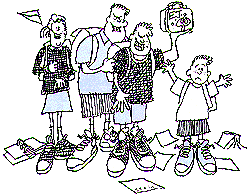We the People: The Citizen and the Constitution
Middle School Grades
Student Book
Purpose of Lesson
This lesson introduces you to some of the basic ideas which were of great importance to the Founders. They used these ideas when they developed our government. You will learn why they thought we need a government in the first place. You will also learn how they believed governments should be created and what they ought to do.
Terms to Know
- natural rights
- philosopher
- government
|
- absolute power
- state of nature
|
- consent
- social compact or social contract
|
Problem Solving
Identifying Basic Rights
Think of a right you believe all people should have. For example, you probably agree that everyone in the United States has the right to be protected from robbers and burglars. The belief that everyone should have this protection is shared by most people in the United States. We hear about it on television, in the newspaper, and in discussions.
Individually or in small groups, explain how you think rights like the one you have identified can be protected.
Defining "Natural Rights"
Most people in the American colonies believed that everyone had a right to life, liberty, and property. These rights were called natural rights. (Sometimes these are now called basic rights or fundamental rights.) The idea of natural rights means that all persons have these rights just because they are human beings. Everyone is born with these rights and they should not be taken away without a person's agreement.
Many of the Founders believed people receive these rights from God. Others believed that people have them just because it is natural for people to have them.
John Locke was a famous English philosopher. He lived from 1632 to 1704. He had written a book called Two Treatises of Civil Government (1690). In that book he wrote about natural rights. He said that the main purpose of government should be to protect the people's natural rights. He also said that kings should not have absolute power, that is, power without limits. They should not be able to deprive people of their natural rights.
Many Americans had read Locke's book, and they agreed with what it said about government. Those who had not actually read Locke's book knew his ideas from newspapers, political pamphlets, church sermons, and discussions.
Protecting Natural Rights
Although people agreed on certain natural rights, they worried about how those rights could be protected. Locke and others thought about what life would be like in a situation where there was no government and no laws. They called this situation a state of nature. They were afraid that in a state of nature their rights would be taken away.

Problem Solving
It's your turn to think like a philosopher
Imagine what life might be like in a state of nature. Think what your classroom might be like if there were no rules. Think what might happen if the teacher didn't have the right to tell anyone what to do.
Work together in groups of about five to answer the following questions about such a situation. Then choose a person to explain your answers to the rest of the class. Then compare your answers with John Locke's which follow.
- What might be the advantages and disadvantages of living in a state of nature?
- What might happen to people's rights?
- What might life be like for everyone?
Compare Your List with John Locke's
You may have seen the same disadvantages in a state of nature that John Locke saw. Locke believed:
- The stronger and smarter people might try to take away other people's lives, liberty, or property.
- Weaker people might band together and take away the rights of the stronger and smarter people.
- People would be unprotected and insecure.
The Social Compact
John Locke and other philosophers developed a solution to the problems that exist in a place without government. In a state of nature, people might feel free to do anything they want to do. However, their rights would not be protected and they would feel insecure.
Locke argued that people should agree with one another to give up some of their freedom in exchange for protection and security. They should consent to follow some laws in exchange for the protection that these laws would give them. This agreement is called a social compact or social contract. A social compact is an agreement people make among themselves to create a government to rule them and protect their natural rights. In this agreement the people consent to obey the laws created by that government.
In a later lesson, you will study the Declaration of Independence. You will see how the Founders included all of the ideas you have studied in this lesson in the Declaration.
Reviewing and Using the Lesson
- What is the purpose of government according to the natural rights philosophers?
- Where does government get its right to govern, according to the natural rights philosophers?
- What is a social compact? Do you think this is the best way to create a government? Why or why not?
- What beliefs about rights were important to the American colonists?
- What rights do you think people should have?
All rights reserved. Permission is granted to freely use this information for nonprofit educational purposes only. Copyright must be acknowledged on all copies. The development of this text was originally funded and cosponsored by the Commission on the Bicentennial of the United States Constitution. The US Department of Education disclaims the responsibility for any opinion or conclusions contained herein. The Federal Government reserves a nonexclusive license to use and reproduce for governmental purposes, without payment, this material where the government deems it in its interest to do so.
ISBN 0-89818-108-9
Textbook sets may be purchased from the Center at a nominal cost through our Online Store. |






